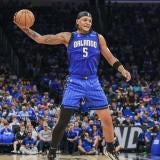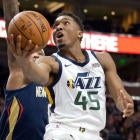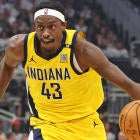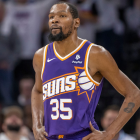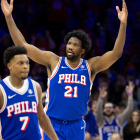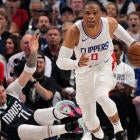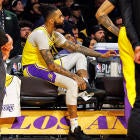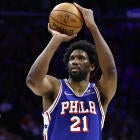Back in 2010, when LeBron James went on national television from the Boys and Girls Club in Greenwich, Connecticut, to announce his Decision to take his talents to South Beach, a 13-year-old boy who would one day become the focus of another potentially franchise-changing NBA decision was one of the kids looking on in the background. His name was Donovan Mitchell.
The decision in question, of course, would come some seven years later, when the Denver Nuggets traded the now-20-year-old Mitchell's rights, after selecting him with the 13th pick of the 2017 draft, to the Utah Jazz in exchange for Trey Lyles.
It's early, so we don't want to get too ahead of ourselves, and certainly a draft-night deal for a guy who's barely played half an NBA season isn't going to register any LeBron-like movement across the league's greater landscape -- not yet, at least. That said, the Nuggets, and everyone else for that matter, have already seen more than enough from Mitchell to know they'd like to have that one back.
"We liked him, he had a good workout for us, shot the ball well, we loved him as a defender with his athleticism and his wingspan, but we didn't think we could get as high as we needed to get him," Jazz assistant coach Johnnie Bryant told CBS Sports. "So when he started dropping and then suddenly he was there and the call for the trade came though, it was like, OK, let's go get him. In the draft, unless you have one of the top few picks, you have to get lucky. You can love a guy and think you're going to get him and then, boom, somebody else grabs him. All the stars have to line up. And for us, they did, and we got our guy."
To be fair, Denver wasn't the only team that regrettably undervalued Mitchell, who was just named Western Conference Rookie of the Month for the second consecutive month -- the first time a player who was drafted outside the top 10 has done so since Isaiah Thomas in 2012. The Knicks reportedly liked him at No. 8, but Phil Jackson loved Frank Ntilikina. You think for a second that the Kings, if they had it to do over, would trade that No. 10 pick to Portland rather than snagging Mitchell? Heck, you think they'd take De'Aaron Fox at No. 5 over Mitchell again? What about Malik Monk at No. 11? Mitchell had a great workout with the Pistons, but they ultimately went with Luke Kennard at No. 12.
There is something to like about all those guys.
A lot to like about a few of them.
But with the obvious qualification that it's way too early to make any definitive statements about what any of these players may or may not become, none of them, with the information we do have at this point in time, appear to be anything close to Mitchell.
"Look, I've been wrong on guys before, we all have, but to me, Donovan was a pretty easy one to get right," a Western Conference scout told CBS Sports. "I've been a big fan of that kid since high school. He's got the athleticism. He's got the work ethic. But he's also a really bright, high-character kid. Now, did I think he would be this good this quickly? No. But I definitely saw him as a guy who could come into the league and have immediate success."
What's interesting is that Mitchell wasn't nearly as sure of himself. He laughs when you ask him if he expected to have this kind of impact this soon, if at all. Talk to people around the Jazz organization, or people who've coached or played with Mitchell in the past, and you'll hear the word humble a thousand times. His high school coach, Jason Smith of the five-time national prep school champion Brewster Academy in New Hampshire, fondly tells the story of how Mitchell's teammates liked to rib him, particularly after he'd screwed something up, that the major recruiting outlets had ranked him as a "borderline" top-100 player.
"We got a lot of mileage out of that," Smith laughs.
That Brewster team was loaded. Mitchell shared the backcourt with Devonte' Graham, who's currently the starting point guard at Kansas. Including Mitchell, 11 NBA players have come out of Brewster, including T.J. Warren, Mitch McGary, Will Barton and 2012 No. 5 overall pick Thomas Robinson. Competition like that in practice every day will humble a kid real quick. He hasn't forgotten where he came from, or how hard it was getting here. A few weeks ago, Mitchell retweeted some of his old high school footage with the following message:
For all the kids who don’t think there good enough watch the last minute and a half of this video... trust me just keep working 🙏🏾 https://t.co/jIBnllCdpB
— Donovan Mitchell (@spidadmitchell) January 22, 2018
How Utah Jazz rookie Donovan Mitchell went from raw, energetic high school power dunker to shot-making NBA lead guard with star potential https://t.co/xNBzamjJrR pic.twitter.com/QFI8y371Yr
— Mike Schmitz (@Mike_Schmitz) January 19, 2018
OK, so the kid wasn't LeBron in high school, even if he was obviously an elite athlete as evidenced by his jumping out of the gym in the first part of that video. But it's not like he was a slouch skill-wise, either. Fact is, Mitchell was already all over most of the northeast Division-1 schools' radars, notably Providence and Boston College, when he arrived at Brewster as a junior, and he eventually became a top-30 recruit nationally. Still, he played sparingly in his freshman year at Louisville, and even after a breakout sophomore year he wasn't convinced he was ready for the NBA until he took a trip to Los Angeles for a CAA pre-draft workout -- a trip that Donovan is quick to point out he paid for himself in order to maintain his collegiate eligibility.
"I packed a few things, some clothes, but I didn't empty my dorm room or anything like that because I kind of thought I'd be going back [to school]," Mitchell told CBS Sports. "I had a pretty good workout the first day, and the guys who are my agents now, they were telling me how well I was doing, that they'd never seen this [kind of workout] before, this and that. But as a kid all you hear is agents are bad, that they'll tell you what you want to hear to get you to come out. So I didn't listen to them."
Mitchell did, however, listen to Chris Paul and Paul George.
"C.P. [Paul] and P.G. [George] came in and worked out with us for about a week or so, and they started telling me the same things I was hearing from the agents, that I was ready for the league, just encouraging stuff," Mitchell recalled. "That's when my mentality shifted and I started believing, like, maybe I am pretty good. Maybe I should continue this. At the end of those seven days, I made the decision to declare for the draft."
It's tempting to imagine where the Utah Jazz might be right now had Gordon Hayward not left for the Celtics. Last season they were the West's No. 5 seed and one of the league's really promising young teams. Losing Hayward, who was the closest thing to a franchise player that Utah had had since a young Deron Williams, was a gut shot. But it would have crippled a lot of other small-market teams a lot worse.
The almost immediate emergence of Mitchell softened the blow considerably as, along with Rudy Gobert, the Jazz have two legit young stars to dream on without having to go through a season or two of tanking. That's why you're hearing Utah might be one of the more active teams as this year's trade deadline approaches, that Rodney Hood and Derrick Favors could well be on the move, that Ricky Rubio, for all his savvy and influence on the younger Mitchell, has the feel of a short-term marriage, because the Jazz have their future, and Donovan Mitchell is it.
Sure, there are cases of guys having great rookie years who have eventually flattened out, if not fallen off precipitously, as the league caught on to their game and started devoting more and more time to scouting them (think Michael Carter-Williams, who's averaging four points a game as a back-end rotation player this year in Charlotte after winning Rookie of the Year in 2014). But that's the thing with Mitchell: He's already being scouted, and prepared for, like a superstar.
Every night, Mitchell is the defense's No. 1 priority, almost always drawing the toughest individual defenders. One game he's got Andre Roberson shadowing him. Another night it's Trevor Ariza. As opposed to a fellow rookie like Boston's Jayson Tatum, who's afforded the luxury of existing as a secondary option while the defense focuses on Kyrie Irving, Mitchell has some of the fiercest defenders in the league gearing up specifically to stop him. And still, they can't. He's too athletic. Too crafty and skilled. Surprisingly, he's too good a shooter.
"When Donovan arrived [at Louisville], he had a reputation as a great athlete, of course, but there were questions about his ball handling, and even more so, his jump shot," said current Louisville interim coach David Padgett, who coached Mitchell for two years with the Cardinals under then-head coach Rick Pitino. "He had a really flat shot, and it just wasn't a very consistent stroke. He spent two summers, every day in the gym, just working, working, working. He improved his arc. He extended his range. He turned himself into a great shooter. I give Donovan all the credit in the world, because he worked for everything."
Mitchell's college numbers didn't necessarily reflect a great shooter, but certainly a good one -- he elevated his 3-point mark from 25 percent his freshman year to 35 percent his sophomore year, but overall he fell to 40 percent from the field, which is surely one of the reasons he slipped in the draft.
"He had to take a lot of tough shots at Louisville," the same Western Conference scout said. "You can't always just look at the percentage. And again, I'll keep going back to the work ethic, that character. You knew he wasn't going to settle, that he was going to keep getting better."
Getting better would be an understatement. Back on Dec. 4, before the Wizards took on the Jazz, Washington coach Scott Brooks called Mitchell one of the best rookies in the league. After Utah beat the Wizards by 47 points and Mitchell scored 21 on a smooth 8-of-13 shooting, Brooks revised his statement.
At the start of the game Scott Brooks said Donovan Mitchell is arguably the best rookie. At end of game he said he’s one of the best players in the league! @spidadmitchell @utahjazz
— kristen kenney (@kristenkenney) December 5, 2017
Yes, you read that right. Brooks, who knows a thing or two about elite talent having coached the likes of Kevin Durant, Russell Westbrook and John Wall, said Mitchell was already one of the best players in the league less than two months into his career. It may have sounded like an ambitious evaluation back then, but it's starting to look like Brooks was ahead of the curve as Mitchell, who's shooting 44 percent overall and a solid 35 percent from three, has continued to separate himself as a two-way star -- with two-way being the operative term. Indeed, Mitchell's defense, which has always had elite upside, gets lost. He can really guard and is a key part of Utah's top-10 defense entering Friday.
"What stands out is his ability to create offense and his decision making has continued to improve," Jazz coach Quin Snyder said. "We're throwing a lot at him. He's playing some backup point guard for us in addition to being our most aggressive offensive player, and he's handling all that without forgetting about the [defensive end], where he's often times matched up on a pretty good player."
To Snyder's point that Utah puts a lot on its star rookie's plate, entering Friday Mitchell is tied with Dennis Smith Jr. for the league's highest usage percentage among rookies, which is a fancy way of saying he has the ball in his hands a ton (on par with John Wall in Washington), and still, with all that responsibility, at just 20 years old, his lapses in judgment are rare, as are any lulls in his production. His 61 made 3-pointers through the first 25 games of his career were the most by a rookie in NBA history, breaking Damian Lillard's previous record of 56.
All told, if you throw out the first half-month of his career when he wasn't even starting, Mitchell has only failed to score in double digits three times the entire season. He's scored 20 points or more 23 times, 25 or more 13 times, and back on Dec. 1, he broke Utah's single-game rookie scoring record with 41 points against the Pelicans. To score with that kind of consistency, as a rookie and against defenses designed to stop you no less, you can't be one-dimensional. You have to be able to score in multiple ways, off the dribble, off the catch, runners, floaters, at the rim, threes, mid-range, and indeed Mitchell has all the goods. Have a look at this terrific breakdown by SB Nation:
You can already tell Donovan Mitchell is a star. pic.twitter.com/JiNkgJeSNl
— SB Nation (@SBNation) January 24, 2018
"Last summer, I told him, you have to learn to play off one foot," Bryant said. "Donovan is a dominant two-foot jumper, and in the NBA, if you take that second step to gather, to go off two feet, you'll get your shot blocked or have trouble even getting it off. The James Hardens, the Manu Ginobilis, the Dwyane Wades, all those guys go off one foot most of the time in the lane, because they can cover ground in any direction, side stepping, fading back, of course the Euro step, subtle counters depending on the way the defender plays you. DeMar Derozan is another great footwork guy. It takes a while to pick that stuff up, but Donovan, as far as being a fast learner, he's the best I've been around."
Bryant is a hoops junkie. He'll talk about the nuances of the game with you all night. And as the coach who generally works Mitchell out before games, he knows his game as well as anyone. Bryant recalls being impressed with Mitchell when he spent the whole flight from Salt Lake City to Las Vegas for the NBA's Summer League watching film.
"But he doesn't just watch it. He goes to the gym and works on it, and before you know it, he's got it," Bryant said. "I'll tell you a quick story. It was preseason, and we were working on sort of a Euro step move, if you can visualize coming at the defender full speed, ball in your left hand, and you throw the ball into the middle of your body like you're going to your right, but then you pick it up and Euro step back to your left. Guys like Harden make that move look easy, but it's not. So we worked on it for a day, and the very next night he did it to Tyson Chandler in a game, just like that. That's when I think I started to realize we had a special player."
Suffice it to say, a lot of other people are starting to realize the same thing. But Mitchell is paying the attention no mind. He says early in the season he was comparing himself to the other rookies in this stellar class, which is only natural for a competitor, but he found that it was hurting his game trying to keep up. So he put his head down, and he hasn't lifted it up since.
"That's a lot of what P.G. and C.P. told me before the draft. Just to stay focused and block out the noise," Mitchell said. "They congratulated me when I won Rookie of the Month and told me they were proud of me, but they also reminded me that I'm not here to win just one award for a month. I'm here to do big things in this league."











